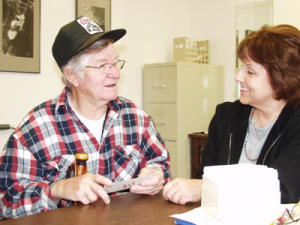Stroke Rehabilitation
 Aphasia is the term for loss of language after a stroke. Each person may experience different challenges including difficulty speaking in phrases, difficulty naming items, and difficulty finding the right word to say, among many other challenges. Through working with a speech therapist, patients learn strategies and regain functional skills to improve their ability to verbally communicate.
Aphasia is the term for loss of language after a stroke. Each person may experience different challenges including difficulty speaking in phrases, difficulty naming items, and difficulty finding the right word to say, among many other challenges. Through working with a speech therapist, patients learn strategies and regain functional skills to improve their ability to verbally communicate.
There are many types of aphasia, and depending on the location of the stroke within the brain, a person may exhibit a variety of symptoms. Here are some brief descriptions of the various types of aphasia:
Expressive aphasia: a person with expressive aphasia will have difficulties verbally expressing his or her thoughts. Despite thinking clearing, and understanding what is said, they will be unable to form a sentence or speak clearly without frequent pauses, mispronounced words, or difficulty thinking of the right word in the right moment.
Receptive aphasia: a person with receptive aphasia may be able to speak in fluent sentences, but these sentences may be lacking in content or may be comprised of non-words. In this type of aphasia, a person is unable to comprehend information and therefore will have difficulty comprehending their own language as they are speaking.
Many people experience a mix of these symptoms in which we identify difficulties as mixed expressive and receptive aphasia.
In addition to difficulty speaking or understanding the words of others, many people with aphasia experience difficulty with reading, writing, simple mathematics and basic tasks such as telling time.
To learn more about aphasia, contact our office to speak with a therapist or visit the National Aphasia Association at www.aphasia.org.
